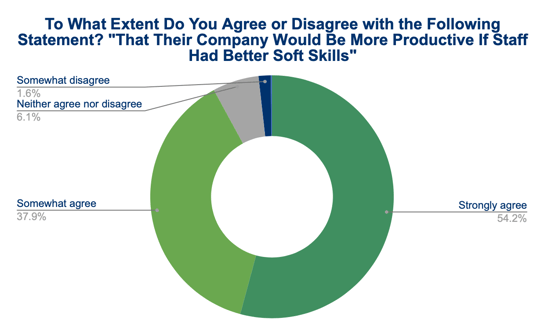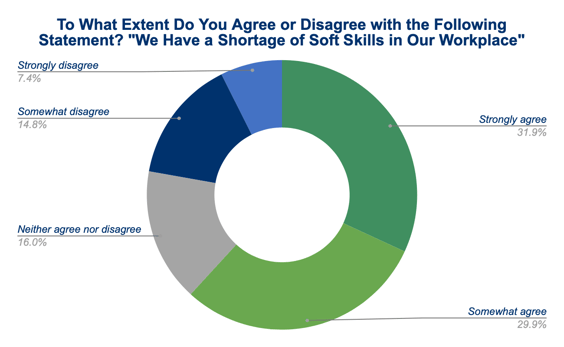As the technological revolution takes hold and business, as we know it, continues to change - good leaders need to be able to adapt. They need to be able to adapt to the circumstances and pivot their business in a way that makes them as effective and future-proof as possible. As technology displaces employees, a new workforce will emerge, a workforce which is underpinned by soft skills...a recent statement in a report published by Accenture summed it up nicely:
“Humans and machines can amplify each other’s abilities but soft skills—human skills—will be the future differentiators.”
Leader’s know it - with a recent Docebo report finding that 92% of Executives identify soft skills as the most essential skill set to develop through talent development programs. This may not come as a huge surprise to many businesses, but the real question is… is your organisation ready?
Here at Ethical Angel, we support businesses to navigate the ever changing L&D by helping them understand their employees training needs and driving improvements with purpose-led learning. To aid with this, we conducted a survey of over 1000 business leaders around the UK which revealed some fascinating insights, alongside supporting the findings of the Docebo report, and the narrative that emerged matched the trend outlined above. In addition to this, our research raised a worrying problem, the growing importance placed on soft skills is not translating into L&D programmes that deliver training for the soft skills leaders feel are clearly lacking..
What Do Leaders Think About Soft Skills?
There are two clear trends that emerged which leaders agree on:
1. Soft skills have a demonstrable effect on business
2. There is a severe lack of soft skills within business
The Benefits That Can Be Derived from Soft Skills
Our survey reinforced the industry-wide trend laid out above of soft skills becoming a priority in business leaders' minds, with a huge proportion of the 1000 business leaders we spoke to acknowledging the organsiational benefits that can stem from implementing a solid soft skills development plan.
88% of business leaders agreed with the statement that soft skills are directly related to business growth. This is something that we expected leaders would agree on, but seeing them agree in such numbers entrenches the idea that they are clearly looking to the future where automation will take over the more ‘technological’ side of business. This idea isn’t just being seen in more innovative sectors either, as more traditional sectors such as finance are following suit, with one senior leader at ANZ Bank saying:
“We’re much likely to hire you on the basis of your mindset and your ability to adapt than we are on your specific subject knowledge, because that might not be that relevant in a year’s time”
Perhaps, unsurprisingly, when we asked business leaders whether or not they would be more productive if staff had better soft skills, their answer was homogenous across the board:

Our research shows that 92% of business leaders believe that their company would be more productive if staff had better soft skills. However, what was surprising is just how many business leaders feel soft skills directly affect business growth and revenue.
When asked about how much more revenue their company could generate if employees had better soft skills, the overall average answer came out at 17.1%, with over half of the 1000 business leaders stating that their business could increase revenue by between 16-31%. When the average turnover of SMEs within the UK is £795,788 the financial impact of investing in soft skills can be well over £130,000.
This is a clear sign that L&D needs to reassess its priorities in terms of spend. Value among employees is now starting to shift to staff with a high level of interpersonal skills, who have the ability to communicate, empathise and be resilient in the face of change. Subsequently, to get the most out of employees, learning and development departments must shift the focus away from technical skills and instead place a precedent on soft skill development; if they don’t their business will simply fall behind others that do.
The Soft Skills Gap Within Business
Business leaders also recognise that the pandemic has had a real negative impact on employees' interpersonal ‘soft skills’. This shows that now, more than ever is a vital time for companies to have the tools and resources in place to boost employees' soft skills.
We asked leaders to what extent they agreed that the absence of face to face contact with colleagues has created friction amongst staff and teams...
Over 66% of the 1000 business leaders we spoke to agreed with the statement. This shows that as workplaces start to return to ‘normal’, leaders and their HR/L&D teams need to do more to rekindle those relationships that are so key to the running of a successful and efficient business.
This idea is accentuated in another question from the survey:

Over 600 out of the 1000 leaders agreed that they have a shortage of soft skills within their workplace... Once again, the message is clear - leaders understand the soft skills gap within their organisation, but what are they doing about it?
The Impact on Employee L&D
The logical assumption from the significant increase in leaders believing that soft skills will underpin the future workforce would be that new L&D strategies are implemented to close those skills gaps. But the reality is, it’s not. Our research found that only 36% of employees have been helped to understand soft skills and that drops to 34% when looking at the number of staff members that have received a clear plan to improve their soft skills. This shows that more work needs to be done to bridge the gap between management and L&D, as there is a clear disconnect between what senior leadership feel their business needs and the training L&D is providing.
What Does All This Mean for the Future of L&D?
Our research into business leaders' thoughts of soft skills shows some clear-cut trends. They fully understand both the severe lack of soft skills within business alongside the countless benefits that could be realised within both culture and revenue if a sound soft skills training programme was implemented.
The takeaway from this is clear - the conversation about the importance of soft skills in the L&D space is finally filtering up to senior management. This means that clear plans must be put into place to improve soft skills and that L&D reports on these improvements to ensure management sees the value that is being added by a comprehensive and effective L&D plan.
However, If your senior management team is yet to buy into the importance of soft skills, keep banging the drum! It is your responsibility as HR/L&D leaders to ensure that they are bought in.
If you don’t do it, your competitor will…
Ethical Angel allows your employees to practice these soft skills in a real-world environment - book a 30-minute discovery call to find out more!